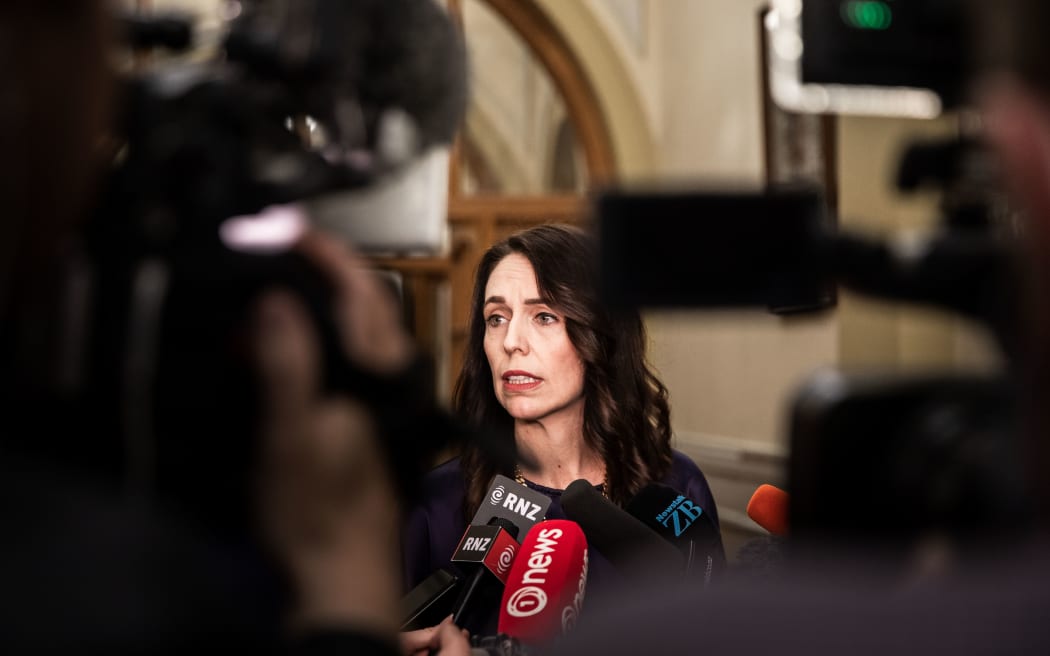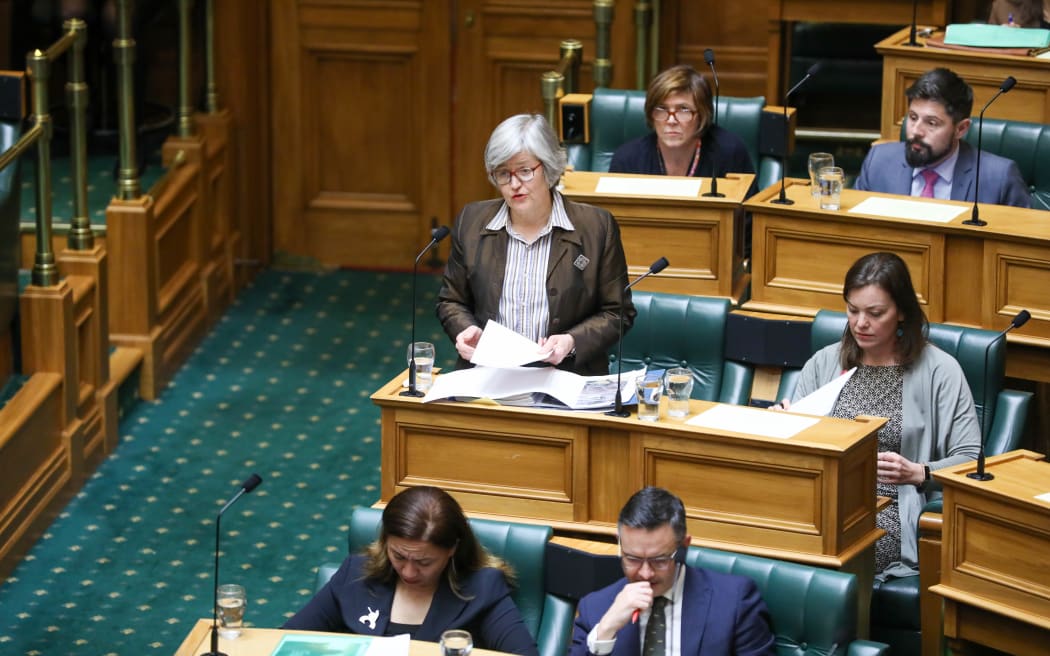
Photo: RNZ / Samuel Rillstone
Cabinet will today discuss an entrenchment provision in the three waters legislation after lawyers and opposition parties criticised the move as unconstitutional, Prime Minister Jacinda Ardern says.
The Water Services Entities Bill passed through the committee stage under urgency last week and is set for its third and final reading in Parliament next month.
It is the one of several bills relating to the government's three waters project, which would shift responsibility for water management from councils to four purpose-built water service organisations.
The outcry, however, surrounds a supplementary order paper (SOP) - an addition to the bill suggested by the Green Party and voted in with Labour's backing - which would make it harder for future governments to overturn anti-privatisation provisions in the proposed law.
The protections include:
- If the water service entity wants to sell some of all of its assets, it needs sign-off from at least three quarters of its regional representative group - a strategic oversight body made up of council members and mana whenua
- It also needs to hold a referendum on the sale which all electors in its local government areas can vote on, and win 75 percent of the vote
Opposition parties including National had criticised the legislation before it was even brought to Parliament, warning - among other things - that the assets risked being privatised anyway because any future government could simply rewrite the law to bypass those provisions.
The government brought together a working group of mayors and iwi representatives to suggest improvements that could be made before the bill was taken to Parliament. They suggested the privatisation protections be covered by a further "entrenchment" which would require the support of three quarters - 75 percent - of MPs in Parliament for those aspects to be changed.
National had repeatedly ruled out privatisation of water assets, but explicitly refused to back even that aspect of the reform programme, which - because of the high bar it would set for repeal - would have required their support.
The ACT Party also refused to back it, saying it was a smokescreen and a distraction because no one was proposing privatisation. "Smokescreen" was the same language Infrastructure Minister Grant Robertson had used to describe ACT's policy, which is to use public-private partnerships to increase investment in water services.
Read more:
- Three waters part II: What you need to know
- Anti-privatisation entrenchment rejected by opposition parties
- Three waters co-governance debate diverts into privatisation
- Three waters 35-year contracts 'de facto' privatisation, academic warns
The rest of the bill only requires a simple majority of more than 50 percent - or 61 MPs - to pass, which Labour can and is expected to comfortably do on its own.
What the Greens' SOP did was suggest a watered-down version of that entrenchment clause: requiring 60 percent support to overturn the privatisation provisions.
Constitutional lawyers like Dean Knight have warned, however, this would set a dangerous precedent in law-making, enabling any government of the day to use whatever majority it can muster to ensure it cannot be overturned without a future government achieving the same level of support.
They argue entrenchment provisions are - by convention - applied only to matters of electoral law. As Otago University law professor Andrew Geddis told Morning Report, this was to ensure the system remained fair and was not subject to things like gerrymandering.
"The basic idea is majorities rule - so Parliament can pass any law it wants on anything, we give it all that power to make law, contingent on if a new majority comes along in future they can change it back," he said.

Photo: RNZ / Cole Eastham-Farrelly
"We only protect a very few bits of law from that process - so there's some bits of our electoral act, the length of term of Parliament, the voting age, the method in which we vote, how electorates get drawn up - those things require a supermajority of 75 percent to change, that's because we don't really trust current majorities to make rules on those things because they could make rules that benefit them - the current government could [for example] extend the current term to five years, give themselves more time in office."
"The trick is to think of something you disagree with - a policy you really don't like - say, maybe three strikes sentencing, because that's something I'm pretty opposed to, why shouldn't your political opponents who really like that policy take the same position as you are and say 'this is so important we're going to put it into law and we're going to say it can only be taken out if 60 percent of MPs agree in the future'."
Knight, Geddis and six other legal academics have penned an open letter objecting to the way the amendment was introduced, lack of debate about its effects, and the precedent it would set - saying the privatisation provision did not meet the same constitutional threshold as other entrenched laws.
Cabinet to discuss entrenchment principles - Ardern
Prime Minister Jacinda Ardern told Morning Report that Cabinet would discuss the matter today during its weekly meeting.
"The subject matter was on an issue that actually a majority of parties in Parliament agree with - which is not privatising water assets - so we'll just put the subject matter aside and come to the principle of entrenchment.
"The norm generally tends to be a supermajority, so there's a few things about the situation that were a bit quirky, so that's why we'll be having a conversation around that today," she said.
"I don't want to get ahead of the conversation because there are a range of options to deal with just generally how do you protect the entrenchment provisions to ensure they're not widely used, but again I'll just keep my powder dry there."
'Desperate attempt' to manufacture debate about privatisation - Goldsmith
National's Justice Spokesperson Paul Goldsmith said law-making was simply not done that way in New Zealand, and it was a new and dangerous precedent that would "handcuff a future government".

Paul Goldsmith Photo: RNZ / Dom Thomas
He said privatisation was not in the same ballpark as electoral matters.
"Look, that would be a desperate attempt to try to manufacture a debate about privatisation which there isn't - nobody's proposing privatising water, it's not an issue," he said.
"It could be about privatisation of water, it could be about three strikes legislation, it could be about a tax rate, it could be about anything - the point we're making is in the New Zealand political context we don't require these supermajorities.
"We certainly wouldn't go about it in a sneaky underhand way which is what they did during a rolling debate in the House without any debate, without any public consultation, without any kind of constitutional norms."
He said the government could send the bill back to the select committee for the matter to be corrected. He said the suggestion National could privatise the assets in a future government was a "student politics approach to what is a very important issue".
'Have to question what National's plans are' - Sage
Green Party Three Waters Spokesperson Eugenie Sage argued the matter was important enough to be requiring a higher level of support to overturn.
She noted only the privatisation provisions were being entrenched.
"There was 80,000 submissions and a lot of concern in those submissions that our three waters - drinking water, wastewater and stormwater - stay in public ownership. So this is entrenching one clause of the bill," she said.

Eugenie Sage Photo: VNP / Daniela Maoate-Cox
"National has said that it's got no intention of selling, why wouldn't it support entrenchment then? You really have to question what National's plans are. They also opposed a reduction in the term of the contracts from 35 years to 15 years so that the entities can't contract out for more than 15 years."
Sage said water services were "essential to life", and keeping them in public ownership was highlighted by public submissions during the select committee process as important enough to require strong legal protections.
"People make submissions to Parliament in the expectation that MPs will listen, will consider and amend the law to improve it. That's what was flagged at the start of this whole process when the government talked about entrenchment.
"National wouldn't support it - that's why the provision doesn't have a 75 percent majority. The Greens, legitimately using the parliamentary process, put up that supplementary order paper and it was passed."







